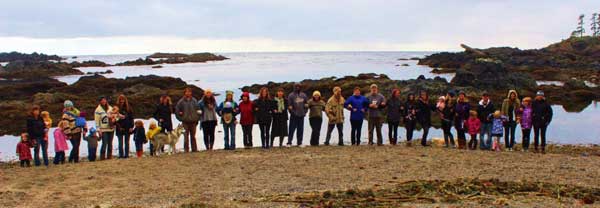When Lester Brown, the avuncular but irrepressibly provocative environmental numbers man from Washington was in Vancouver a few nights ago, he unwittingly waded into a flaring controversy in British Columbia.
Without even knowing that the current BC Liberal government planned to assign our precious Agricultural Land Reserve into the safekeeping of the B.C. Oil and Gas Commission -- a fox and henhouse analogy doesn't even begin to do justice to such a blatant corruption of our environmental and economic security -- Brown calmly laid out the case that world food production is stalling, and that climate change is a big part of the problem.
He also offered up a term that is getting wider recognition globally: "peak water." There are substitutes for oil, but not for water. We can produce food without oil, but not without water, points out Brown, founder of the Worldwatch and Earth Policy institutes. He and many other analysts believe water supplies may well have peaked already, with dramatic consequences for our ability to feed ourselves.
In addition to climate change and peak water, which obviously are linked, soil erosion, the loss of farmland to non-farm uses (like condominium developments), and a plateauing of yields in major grain producing regions of the world are all cause for concern.
In B.C., it is as if none of this matters. We are about to be subjected to a public consultation on the building of the Site C dam, which is already a done deal in the Liberal imagination. Surely that's a good thing -- think of all the water it will capture! Except it will do so at the sacrifice of 5,550 hectares of prime Peace River agricultural land and wildlife habitat, a huge draw down on B.C.'s already limited ability to feed itself.
Why build Site C in the first place? Apparently we're going to need all that power to fuel Premier Christy Clark's fantasy of 150 years of future liquefied natural gas development, which sits nicely alongside the hydraulic fracturing that will continue to damage large swathes of northern B.C.'s water table, not to mention Enbridge's Northern Gateway pipeline that somehow, magically, now seems to comply with Clark's "tough" conditions for shipping tar sand sludge through pipelines alongside some of the most pristine waterways left in B.C.
These Liberals seem to lack ambition -- can't they get a few new coal mines in there while they're at it?
Loading the climate dice
When you put all these plans together, it begins to look like Victoria is not just gambling with our future -- they've loaded the climate dice, in the language of Oxford University professor Myles Allen. Just liquified natural gas developments alone mean it will be impossible for B.C. to meet its target of reducing greenhouse gas emissions by 33 per cent by 2020 (a target set in 2007 by Clark's predecessor, Gordon Campbell). Actually, that's not just a target; it's a law brought in by the Liberals themselves, but the Clark government seems hell-bent on breaking it.
As our premier puts it, it's all part of "getting to yes" in terms of economic development, which sounds more like a frat boy trying to get lucky than the workings of a so-called democracy. All the more reason to participate in Saturday's anti-Northern Gateway rally at Science World in Vancouver at 2 p.m., itself just one event in a national day of action to defend our climate. Think of it as helping our bewildered politicians learn how to get to "no."
The government justifies its scofflaw behaviour as necessary to create economic growth to keep the province working. You might remember Clark saying in the election campaign that she didn't want "Peter and Paul" to get jobs in Alberta, she wanted them right here, developing our resources, paying taxes -- the usual mantra. So without a blink, B.C. has set itself on a path to break its own laws and miss its greenhouse gas reduction targets.
If, like me, you find an unconscionable abandonment of our global and local responsibilities in the face of glaring evidence that climate change is a death sentence for thousands, more likely millions of people in our lifetimes, then you'll be even more alarmed to learn that we might already have passed not just peak oil and peak water, but peak climate.
A devastatingly clear and important new book, The Burning Question, makes the case that we already have vastly more oil, gas and coal in the world than we can safely burn. In Copenhagen in 2009, when very little else was agreed upon, world leaders grudgingly conceded that a temperature rise of more than two degrees Celsius over pre-industrial levels was a line over which we cannot step.
Authors Mike Berners-Lee and Duncan Clark cite estimates that we already are at 1.4 degrees and that even two degrees comes with enormous risks. They cite those wild-eyed radicals at PricewaterhouseCoopers, meanwhile, as saying that "ambitions to limit warming to two degrees Celsius appear highly unrealistic." Especially, one might add, when governments like British Columbia's so freely dispense with the only legislated target that might constrain us to do our bit for the planet.
What is extraordinary about The Burning Question is how squarely the authors lay the blame for what comes next on decisions we make right now. This isn't about a windmill here or a solar panel or nuclear power plant there, and it certainly isn't about energy conservation and some nice social marketing about consumer choices. This is no longer softball, it's hardball.
What we must do
Stephen Harper and Alberta's Alison Redford and Christy Clark and their ilk claim to be interested in the numbers. Well, if we want the world to look even remotely like it does now 50 years from now, we need to stop exploring for more oil and gas and coal, because we cannot afford to burn it.
It does a disservice to the authors to summarize their book, whose "steely numbers," in the words of the Guardian newspaper, are backed by brilliant graphics and a severe logic that refuses to do what politicians continue to do, which is to evade the compelling evidence that when the current carbon bubble bursts, we are doomed.
The book is further enhanced by Bill McKibben's foreword that points out that scientists estimate we can put roughly 565 more gigatonnes of carbon dioxide into the world's atmosphere by mid-century and still have a hope of staying below two degrees. The problem is, there are already 2,795 gigatonnes of carbon in the proven reserves of the world's fossil fuel companies. That's five times what we already can barely afford to put into the atmosphere as it is, and that's without prospecting for any more fossil fuel in B.C., or anywhere else.
Put another way, that's $27 trillion worth of assets, only 20 per cent of which we can afford to drill or dig up or frack and convert into fuels. Put another way, to keep 80 per cent of that in the ground where it needs to stay, we need to write down $20 trillion of the combined assets of the most powerful economic sector in the world and ban them from looking for more.
That's the magnitude of the problem, right there. Our political leaders, addicted as they are to growth, are lying to us every day. We expect that of them, sadly, but we don't usually think they're going so far as to put our very lives at risk. It's high time we got serious answers -- not just platitudes about jobs -- to the burning questions of our time. ![]()
Read more: Environment
















Tyee Commenting Guidelines
Comments that violate guidelines risk being deleted, and violations may result in a temporary or permanent user ban. Maintain the spirit of good conversation to stay in the discussion.
*Please note The Tyee is not a forum for spreading misinformation about COVID-19, denying its existence or minimizing its risk to public health.
Do:
Do not: